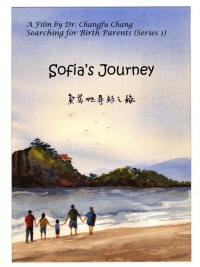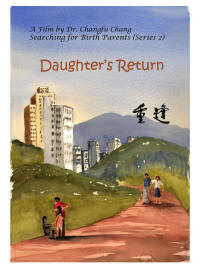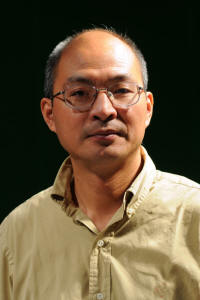FCC North Texas,
The Federation of Chinese Organizations of DFW and
The Dallas Chinese Community Center
Proudly Present
Dr. Changfu Chang
Join the award-winning documentary filmmaker for a screening and discussion of his latest works: Sophia's Journey and Daughter's Return.
Please join Families with Children from China – North Texas, the Federation of Chinese Organizations and the Dallas Chinese Community Center in welcoming Dr. Changfu Chang back to our area for a screening and discussion of his two latest films, Sophia’s Journey and Daughter’s Return.
Called “the professor of adoption films,” Jiangsu native and television and media professor Dr. Chang has produced, written and directed numerous films on adoption, His films, including Love Without Boundaries, My Unforgotten Daughter, The Willow Trees and Long Wait for Home, have been widely praised for their in-depth looks at the issues surrounding international adoption.
His latest films, Sofia’s Journey and Daughter’s Return,follow the journeys of three teenagers as they search for their birth parents in China. Ultimately, each quest becomes the search for their own past, identity, and place in complex relationships entwined with love and abandonment.
These two films, along with Dr. Chang’s widely acclaimed documentaries on international adoption, address timely issues concerning international adoptees. With more than100,000 children adopted out of China in the last two decades, few adopted children have any way of knowing or connecting to their roots since their Chinese birth parents are essentially “invisible” for cultural and political reasons. As a result for many adoptees who are coming of age, the lack of information on their birth parents creates a profound sense of disappointment, frustration, and loss, and in some cases, leads to identity crises.
Many remember Dr. Chang’s last visit, where he screened Long Wait for Home for FCC North Texas. Adoptive Families magazine called Long Wait for Home a “realistic, gritty and heartbreaking” film that provides “answers to the ever-present question: why?” Early reviews for his latest films have called them “riveting and emotion-filled” and engrossing.
Please don’t miss what is sure to be an excellent opportunity to discuss these films with the filmmaker himself.
This event is free and open to the public. To attend this event, please register by Wednesday, April 27th via email at registrations@fccnt.org.
Please note that this seminar is designed for ages 13 and older. Childcare will not be available due to liability. We apologize for any inconvenience.
If you have questions, please contact Jennifer Chapman at (972) 672-4442 or president@fccnt.org.
|
When: |
Where: |
|
Registration: |
Cost: |
About Dr. Changfu Chang
Changfu Chang, a native of Jiangsu Province, China, is a professor at Millersville University of Pennsylvania teaching in the areas of television production and mass media. He holds a Master’s from Nanchang University, China and a Ph.D. from Purdue University, United States. Prior to his coming to the United States in 1995, Dr. Chang worked as a journalist at Fujian Television Station and an editor at a magazine in China. An award-winning documentary filmmaker, Dr. Chang has produced or co-produced a dozen widely acclaimed programs including Chinese Women, The Gate of Fujian, Golden Venture, and Illicit: The Dark Trade.
In the last 10 years, Dr. Chang has been the producer/director/writer of eight films on adoption: Love Without Boundaries, My Unforgotten Daughter, The Willow Trees, Embracing World Cultures, Long Wait For Home, Peer In The Distance, Sofia’s Journey, and Daughter’s Return. Love Without Boundaries (2003), his first documentary on the subject of adoption, is widely regarded as a must-have among the adoptive community and was, along with his other films, aired in major television markets in the United States. In spring 2008, after 5 years of production, Dr. Chang released Long Wait For Home. This much-anticipated film profiles three birth families, several orphanages, and presents Chinese views on international adoption.
Dubbed “the professor of adoption films,” Dr. Chang has received rave reviews for his work. The Adoptive Families magazine called Long Wait For Home “realistic, gritty, and heartbreaking” that provides “answers to the ever-present question: why?” In the revised and updated version of the national bestseller The Lost Daughters of China, author Karin Evans enthusiastically introduced Dr. Chang’s work at length, commending his sensitivity in the depiction of the birth parents and the important contributions he had made to the adoptive community. The Los Angeles Times (12/28/2009) and The Chicago Tribune (01/04/2010) published articles that interviewed Dr. Chang and introduced his work. In addition to many interviews by the U.S. and Canadian media, Dr. Chang was profiled in several Chinese news programs. A 45-minute documentary film featuring Dr. Chang and his work was produced by China’s Jiangsu Educational Television and aired on November 30, 2009.
Versed in the production environments in both China and the West and privileged with the assistance from a Chinese crew (of his former colleagues) and a U.S. crew (of his former broadcast students), Dr. Chang continues to write and produce films for the adoptive community and the general public. Currently, he is working on Orphans In China, which takes an intimate look at the lives of several orphans who are not adopted internationally but remain in Chinese society; the film also addresses various challenges orphans face in an increasingly market-oriented, business-driven society. For more information about Dr. Chang’s productions, please visit: www.lovewithoutboundaries.org.
 About
Sophia's Journey
About
Sophia's Journey
Sofia is the second of the 3 children adopted from China by Marilyn and Peter Robinson of Grand Junction, CO. A lead singer of her school choir and an accomplished dancer, Sofia often wonders where her talent comes from. Are her singing and dancing inherited traits? Her lack of knowledge of her birth parents has left her with an emotional void, a “hole in her heart.” She has only a few “known” facts the orphanage provided: she was picked up by a company employee on his way to work and her birth parents had left a note. However, once in China, she finds herself struggling with a new identity: There was no such note from her birth parents and her birth date was fabricated for the sake of "quick adoption"; the worker claimed that he and his wife had adopted her, even producing an album with pictures of Sofia in the first six months of her life.
An excited and emotional Sofia whole-heartedly throws herself into the arms of this newly found couple, whom now she calls “mama” and “papa” in Chinese. She stays online talking with them frequently. However, questions remain: why did they then give her up to the orphanage? How can one forget the name of the woman who gave a child to you and even lived with you for a month? Seeing their child sucked into this effusive love from the family in China, Marilyn and Peter face a dilemma: should they burst the bubble and take this new “love” away from Sofia, leaving another gaping hole in their daughter’s heart? Should they let the illusion continue to grow and potentially to hurt Sofia in the long run?
 About
Daughter's Return
About
Daughter's Return
Sofia is the second of the 3 children adopted from China by Marilyn and Peter Robinson of Grand Junction, CO. A lead singer of her school choir and an accomplished dancer, Sofia often wonders where her talent comes from. Are her singing and dancing inherited traits? Her lack of knowledge of her birth parents has left her with an emotional void, a “hole in her heart.” She has only a few “known” facts the orphanage provided: she was picked up by a company employee on his way to work and her birth parents had left a note. However, once in China, she finds herself struggling with a new identity: There was no such note from her birth parents and her birth date was fabricated for the sake of "quick adoption"; the worker claimed that he and his wife had adopted her, even producing an album with pictures of Sofia in the first six months of her life.
An excited and emotional Sofia whole-heartedly throws herself into the arms of this newly found couple, whom now she calls “mama” and “papa” in Chinese. She stays online talking with them frequently. However, questions remain: why did they then give her up to the orphanage? How can one forget the name of the woman who gave a child to you and even lived with you for a month? Seeing their child sucked into this effusive love from the family in China, Marilyn and Peter face a dilemma: should they burst the bubble and take this new “love” away from Sofia, leaving another gaping hole in their daughter’s heart? Should they let the illusion continue to grow and potentially to hurt Sofia in the long run?
